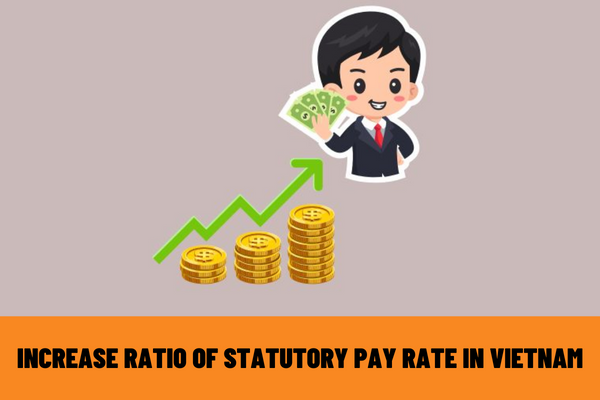What is the increase ratio of statutory pay rate in Vietnam? What is the source for the increase in statutory pay rate in Vietnam from July 2023?
What is the increase ratio of statutory pay rate in Vietnam?
Pursuant to the provisions of Article 3 of Decree No. 24/2023/ND-CP prescribing statutory pay rate for officials, public employees and armed forces:
Statutory pay rate
…
2. From July 01, 2023, the statutory pay rate is VND 1,800,000 per month.
...
Thus, the new statutory pay rate from July 1, 2023 is VND 1,800,000/month.
Compared with the provisions of Decree No. 38/2019/ND-CP, the statutory pay rate is increased from 1,490,000 VND/month to 1,800,000 VND/month.
Thus, the increase ratio of statutory pay rate from July 1, 2023 is 20.8%.

What is the increase ratio of statutory pay rate in Vietnam? What is the source for the increase in statutory pay rate in Vietnam from July 2023?
Who is eligible for an increase of statutory pay rate from July 1, 2023?
Pursuant to the provisions of Article 2 of Decree No. 24/2023/ND-CP as follows:
Regulated entities
Employees on payroll prescribed in Article 1 of this Decree include:
1. Officials from central echelon to district level prescribed in Clause 1 and Clause 2 Article 4 of the Law on Officials 2008 (as amended in the Law on amendments to the Law on Officials and the Law on Public Employees 2019).
2. Officials at commune level prescribed in Clause 3 Article 4 of the Law on Officials 2008 (as amended in the Law on amendments to the Law on Officials and the Law on Public Employees 2019).
3. Public employees working in public sector entities prescribed in Law on Public Employees 2010 (as amended in the Law on amendments to the Law on Officials and the Law on Public Employees 2019).
4. Employees who work under employment contracts as prescribed in the Government’s Decree No. 111/2022/ND-CP dated December 30, 2022 on contracts of employment for certain tasks in administrative units and public sector entities, and are eligible for, or have agreed under the signed employment contracts on, salary payment according to the Government’s Decree No. 204/2004/ND-CP dated December 14, 2004 on pay policy for officials, public employees and armed forces.
5. Employees on state regular payroll in state-funded associations as defined in Government's Decree No. 45/2010/ND-CP dated April 21, 2010 on organization, operation and management of associations (as amended in the Government's Decree No. 33/2012/ND-CP dated April 13, 2012).
6. Commissioned officers, professional soldiers, non-commissioned officers, soldiers and national defense workers and public employees, contractual employees in the People's Army of Vietnam.
7. Commissioned officers, non-commissioned officers on payroll, non-commissioned officers, conscript soldiers, public security workers and contractual employees in the People’s Police of Vietnam.
8. Employees working in cryptography organizations.
9. Part-time employees in communes, hamlets or neighborhoods.
Thus, there are 9 subjects who will receive a statutory pay rate increase from July 1, 2023 according to the above provisions.
What is the source for the increase in statutory pay rate in Vietnam from July 2023?
The funding sources for the increase in statutory pay rate are specified in Article 4 of Decree No. 24/2023/ND-CP as follows:
Funding
1. Ministries, ministerial agencies, Governmental agencies, other agencies of central government shall:
a) Use 10% unused funding for recurrent expenditures (excluding salaries, salary-based allowances, salary equivalents and other human-related costs) as per 2023's budget estimates as compared with 2022’s budget estimates given by competent authorities;
b) Administrative units and public sector entities that have revenues shall set aside their own funds for salary reform from their retained revenues as prescribed by law after deducting costs of providing services and collecting service fees;
c) Use the remaining funds for the 2022’s salary reform (if any).
2. Provincial authorities shall:
a) Use 10% unused funding for recurrent expenditures (excluding salaries, salary-based allowances, salary equivalents and other human-related costs) as per 2023's budget estimates given by competent authorities;
b) Use 70% increase in local budget revenues in comparison with revenue estimate (excluding revenues from land levies; lottery; equitization and divestment from state-own enterprises managed by provincial authorities; land rents paid in lump-sum by investors for paying compensation and land clearance costs, and revenues from disposition of public property at regulatory authorities, organizations and units which are used for covering investment expenditures according to competent authorities’ decision; fees for paddy land protection and development; entry fees to world heritage and relic sites, service charges paid for using infrastructure facilities, public utility facilities and services at border checkpoint areas, environmental protection fees for mining activities, revenues from public land, other yields and public property, and revenues from lease, lease purchase or sale of state-owned housing) given by the Prime Minister;
c) Use the remaining funds for the 2022’s salary reform (if any);
d) Use at least 40% of the retained revenues in 2023 after deducting costs of providing services and collecting service fees. Particularly, public health facilities shall use at least 35% of their revenues from provision of medical examination and treatment services, preventive medicine and other medical services. The use of retained revenues shall comply with the Ministry of Finance of Vietnam’s guidelines on demand and funds for salary reform in 2023.
3. The central government’s budget shall provide financial support for Ministries, ministerial agencies, Governmental agencies, other agencies of central government and provinces if their finances for the 2023’s adjustment of statutory pay rate are insufficient despite their implementation of provisions in Clause 1 and Clause 2 of this Article.
4. Group-1 and group-2 public sector entities shall themselves cover funding for reform of salaries of their public employees and workers in accordance with the provisions of the Government’s Decree No. 60/2021/ND-CP dated June 21, 2021 prescribing financial autonomy of public sector entities and its amending and/or superseding documents (if any).
Thus, the source of money used to increase the statutory pay rate from July 2023 is taken from the sources according to the above provisions.
LawNet
